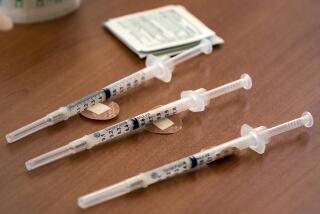Out of Limelight, BD Sees Sales Surge
- Share via
For a global medical technology company with 25,000 employees, Becton, Dickinson & Co., kept a low profile, pouring its strong cash flow into research and development rather than advertising.
Aside from its SpongeBob and Dora the Explorer kids’ digital thermometers, even its consumer products are hardly buzz generators: ACE bandages and hot and cold packs, needles and syringes for diabetics, support hosiery and sports braces.
But amid the nation’s flu vaccine shortage, BD is seeing a surge in sales of its dose-sparing syringes, which have a special plunger that squeezes out virtually every drop of medicine, unlike regular syringes. Because vaccine makers usually compensate for that waste by putting an extra dose or so in the standard 10-dose vial of flu vaccine, by using the BD syringes, medical workers typically can wring an extra half-milliliter dose from each vial.
“The demand for the product immediately began to go up as people learned about the flu vaccine shortage,” said Gary Cohen, president of the BD Medical division.
“Our manufacturing facility went to 24/7 production because of that,” instead of five eight-hour shifts a week, he said.
Now the Franklin Lakes, N.J.-based company is developing a new vaccine system that injects shots into the top layers of skin instead of deep into muscle.
“When vaccines are delivered to that space, they deliver a stronger immune response,” Cohen said.
That’s because cell receptors in the outer layer of skin better disperse the vaccine throughout the body. Cohen said research indicated that one-fifth of a standard flu vaccine dose delivered this way would bring a full immune response.
In addition, because that layer of skin is above the body’s pain receptors, getting a shot would be far less painful. The system is still in human testing and needs federal regulatory approval.
BD already is a leader in developing safety needles that protect health workers from accidental needle sticks as they draw blood from patients for tests.
Late last year, BD launched a new generation of “push-button” safety needles under its Vacutainer brand. After blood is drawn, the nurse or technician presses a small button on the syringe and the needle is retracted from the patient’s skin into the plastic syringe.
That prevents health workers from accidentally sticking themselves while trying to put a protective cap over the needle or carrying it to a disposal container, said Susan Sutherland, who manages health services for the 7,000 employees at UC Davis Medical Center in Sacramento. Her hospital started using the product about nine months ago.
More to Read
Inside the business of entertainment
The Wide Shot brings you news, analysis and insights on everything from streaming wars to production — and what it all means for the future.
You may occasionally receive promotional content from the Los Angeles Times.









